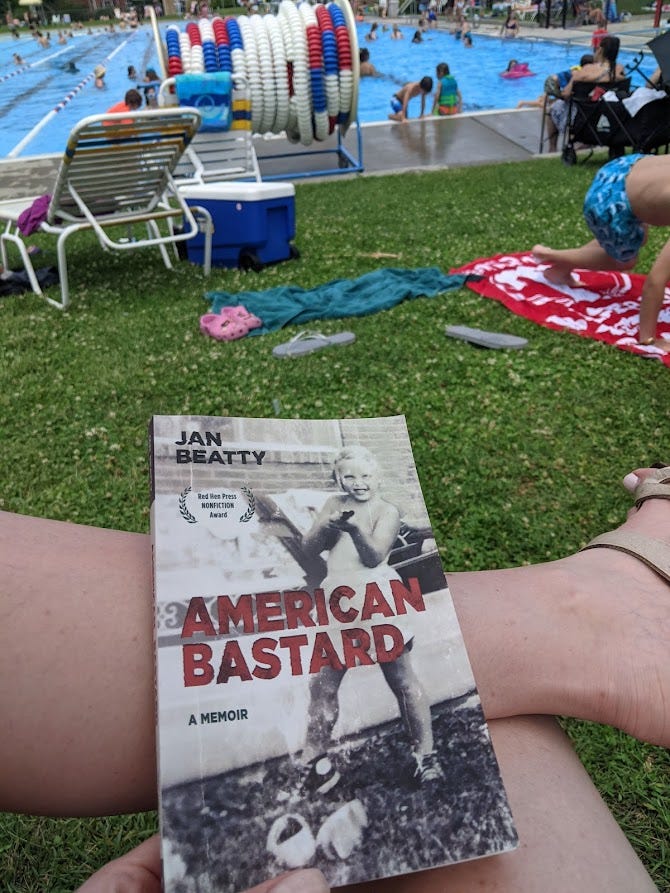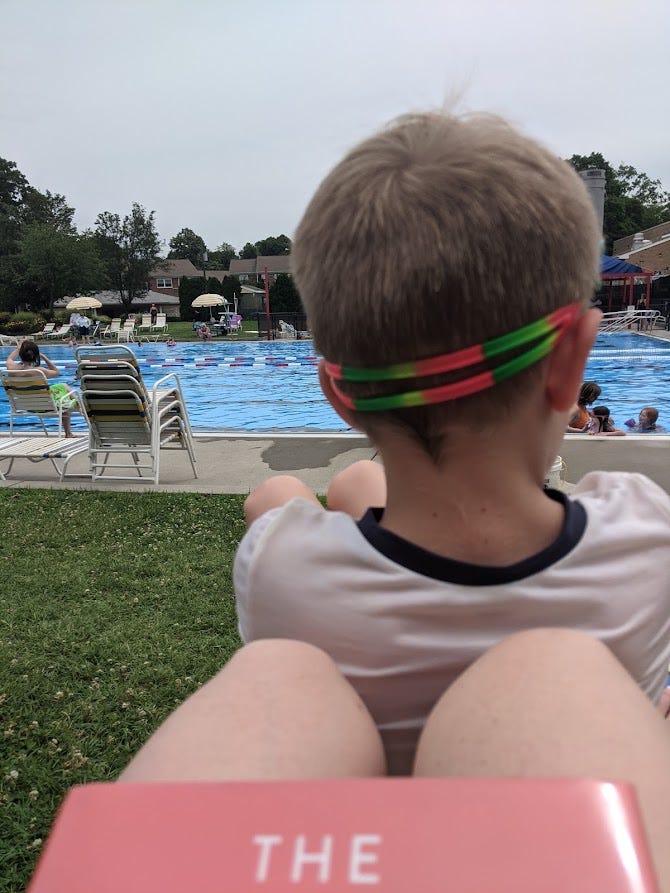how to write in summer time
when in doubt, make a list + resources for summer writing support
Welcome to Write More! This is the monthly intentions email, which goes out the last Sunday before a new month starts. It’s a chance to fight the Sunday Scaries by thinking through your goals and intentions for your writing practice in the coming month and to reflect on your progress in the previous month.
I’ve already gotten a sunburn and spent a small fortune on water ice at the town pool’s snack stand, so it’s officially summer in New Jersey. How are you?
reflecting on June + intentions for July
In June’s newsletter, I talked about the importance of accountability and community in your writing life. I also encouraged folks to adopt a word or theme for the month.
(I’m always jinxy about sharing things in advance, but now that June’s nearly done, I’ll share that mine has been “a good day’s work.” It’s a phrase I borrowed from Jami Attenberg, who used it in the lead-up to the #1000wordsofsummer earlier this month. I didn’t produce 1000 words a day during this year’s challenge, largely because I was working really hard on big revisions for a book proposal, but I did put in a good day’s work, and it was great to really savor that.)
So before we move in to July intentions, take a minute and reflect on your June progress. You might flip back through your notebook or your digital drafts and see what you’ve done. If you keep a formal writing log, you could examine that. I write down deadlines and writing time and targets in my planner, so I always start there. Counting doesn’t always working for me, but I have found it to be really meaningful at some points in my writing life. If you’re interested in strategies for counting writing time and marking progress toward big goals, you could start with this newsletter, where I wrote about strategies for what counts in your writing life as a way to get more of it:
counting should be a kindness to yourself, a way of noting your hard work and seeing how it adds up to something big. So whatever your goals are, writing or otherwise, think of what you could quantify and set up a system for counting it.
Did you pick a word for June? How did your writing go this past month?
writing in summer time
For lots of us, summer means that time works differently. Maybe you have more time for writing because your work schedule is more flexible, or maybe you’ve got less because you’ve got kids home from school. Or maybe—and this is my deal this summer—it’s a wild mix of the two. My kids are in half-day camps for the next two weeks, then they’re entirely gone for two weeks (!!) of sleepaway camp, and the rest of the summer is a mishmash of travel and bits of pieces of camps and activities.
So I’ve been thinking about how to best use these different chunks of time, and I thought I’d share some strategies for writing in summer time—whether that means blissful hours free from other work, 20 minutes before camp pick up, 5 minutes stolen at the playground, or something else—for this month’s intentions newsletter.

when in doubt, make a list
I love a list, but here’s the trick: don’t just make a list of everything you want to do. Chances are most of the things on that list will be too big to make meaningful progress on in a single writing session, whether you’ve got two hours or 15 minutes. What I’m going to suggest you do this month is build a menu of options for writing work that you can pull from based on how much time and energy you have.
Start by thinking about the different kinds of tasks you might work on. Do you have drafts to revise? Questions that require research? Things to re-read? Chapters that require some minor revision? Chapters that are going to need a big structural overhaul? Essays you want to pitch? If you’re not sure where to start, you could think about what you’re hoping to draft, what you’d like to revise, and anything you’ll need to research (that could be content for something you’re writing, or it could mean looking for journals you’d like to submit work to).
Now, think about how much time it might take to make progress on each task. I think about this in roughly three buckets: 10 minutes or less, 30 minutes to an hour, and an hour or more. You don’t necessarily need to calculate how many hours it will take you to draft a new chapter or complete a structural overhaul of an essay. The idea here is instead to know you’ll probably want to work on big, conceptual work like that when you have an hour or more. And if you find yourself with just 10 minutes, you could instead do some quick research that would help plug a gap in the draft. If you’ve got 45 minutes, you could probably re-read a draft and make some notes about revision. Your goal here is to align tasks with time so you can easily pick up something to work on when you have time to write, whether it’s a few extra minutes if a meeting wraps up early, or a whole morning.
Finally, figure out if they’re A tasks (things that require concentrated brainpower, like drafting or major revision) or B tasks (things you can do when you’re not quite as sharp but have some time to work, like re-reading research materials or finding and reading pitch or submission guidelines). My brain is always sharpest in the mornings, so I do my best to save that time for drafting and other work that requires my full brainpower. I don’t always have time later in the day to work during the summer, but when I do, it works a lot better for me to have already identified a couple of easy but meaningful tasks to work on than to spend 4-5pm staring blankly at my laptop screen.
I’ll share my own July writing list on instagram tomorrow. (You can follow that link to find me, or just search for my name.) I’d love to see yours!
more resources for summer writing
Keri Bertino is running another session of Writing for Fucks Ups this summer, starting July 12. I was in her workshop last summer, and it was fantastic—full of practical ways to think about writing practice, problem-solving around particular issues, and overall encouragement. If you’ve ever felt like a fuck-up in your writing life, I think you’ll love it. She’s also running her Writing Through Motherhood workshop, and it starts July 14. (I’ll have an interview with Keri up soon!)
The last newsletter featured a writing prompt from Eva Langston, whose newsletter is consistently jam-packed with writing resources from conferences and contests to workshops and pitch contests.
I can’t vouch for this personally because I haven’t taken it, but KJ Dell’Antonia and Jennie Nash are running a Summer Blueprint challenge. It’s a 10-week program with weekly emailed assignments and the promise that at the end of it, “you will have answered all the hardest foundational questions about your book, developed a clear outline for exactly what to write, and earned the confidence to write forward.” And here’s something really cool: they have both free and paid options. If anyone signs up, please tell me how it goes!
I’ll be back in a few days with my interview with Keri Bertino and also an interview (featuring a writing prompt!) with Erin Flanagan, whose great new thriller Blackout is out soon!
What are your tasks and intentions for July? What did you accomplish in June? I’d love to hear from you. You can always reply to this email, comment below, or find me on twitter (@nancy_reddy) and instagram (@nancy.o.reddy).




Nancy, what a wonderful post! as always... Love the breaking down of tasks by estimated time to complete and brainpower needed - A or B (or C). I tend to do this in my head. I know that the real creative tasks (Poetry and drafts for my Substack) will take up my freshest morning time-chunks of 1-2 hours, but those in between tasks and small tasks I think will be worthwhile to list. Am trying listing on medium size Post-its for short and medium size tasks. I'll see if this is useful. I can imagine needing to sit in the sunshine a piece of every day this month and bringing for example my research for articles in a local paper, writing an intro for a pitch....and so on.